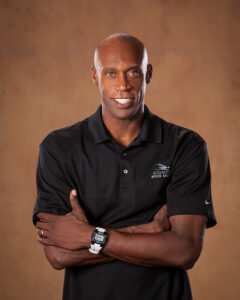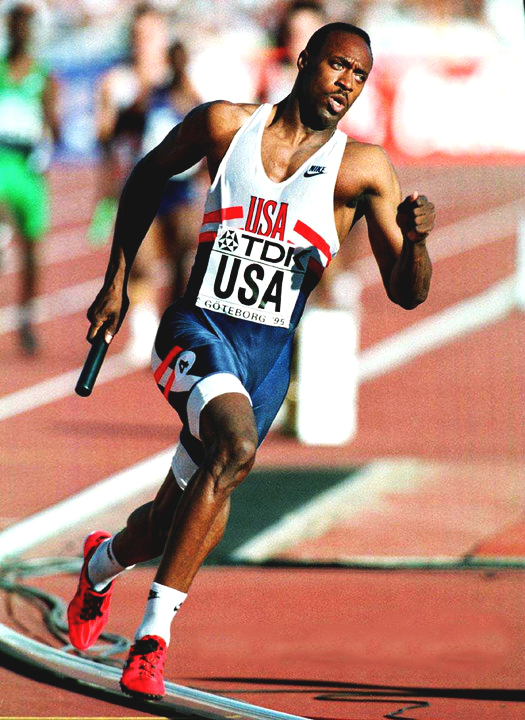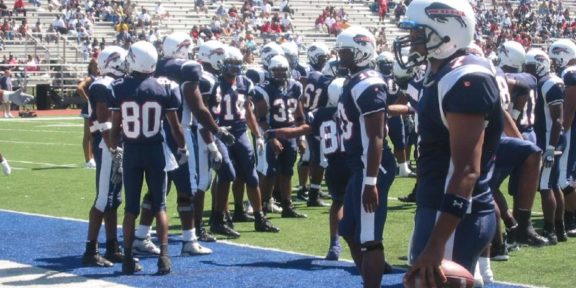By Mekhi Abbott and Monét Bowen
Howard University News Service
The story of former track and field athlete Butch Reynolds is painful and triumphant.
In 1987, Reynolds won the world title in the 4×400 meters relay race at the World Championships in Athletics, a sign of a burgeoning star. The following year, he set the world record in the 400 meters race, breaking a mark that had stood for 20 years. His own best would stand for 11 years.
He then went on to win the gold medal in the 4×400 meter relay and a silver medal in the 400 meters race at the 1988 Olympics. His future appeared bright until the International Amateur Athletic Federation, the international governing body for the sport of athletics, including track and field, suspended Reynolds for two years after falsely accusing him of using performance enhancing drugs.
Now, as doping and drug tests have taken center stage amid the scandals of the 2022 winter Olympics and American sprinter Sha’Carri Richardson’s disqualification from 2020 Olympics after testing positive for ingredients in marijuana, independent filmmaker Ismail Al-Amin looks to clear the name of Reynolds, one of his heroes growing up in Akron, Ohio, the same city where Reynolds was born and raised.
Not one BLACK athlete has been about to compete with a case going on, I don’t care what they say!!!
— Sha’Carri Richardson (@itskerrii) February 14, 2022
Al-Amin Films & Crestview Ave Productions in collaboration with ESPN will tell Reynolds’ story in the forthcoming documentary “False Positive: The Butch Reynolds Story.”
Reynolds’ ascension as a high school track star, then further fame at The Ohio State University two hours away and onto the world stage at the Olympics and World Championships made him a hero to the residents of Akron, Al-Amin said.
“Before LeBron [James], Butch was that guy from Akron. The guy,” he said.
Gold medals, silver medal, a world record, Reynolds was on the brink of even more fame and financial gain until he was suspended for two years in 1990 for allegedly taking performance enhancing drugs.
His suspension meant he could not compete in the 1992 Olympics just as he was entering his athletic prime. Additionally, he could not participate in any other athlete competition; he couldn’t earn a living practicing his profession.

Al-Amin said his ESPN documentary will show many aspects of athletics and of Reynolds’ life, but it will make one thing particularly clear.
“I want the world to know the lab technician publicly admitted that he accidentally circled the wrong athlete’s urine sample.”
When the technician gave the results of Reynolds’ urine sample, they mistakenly confused them with two other athletes. The other athletes had taken performance enhancing drugs, not Reynolds. Additionally, Reynolds voluntarily took another, more extensive drug test the following week and tested negative, according to case documents.
Reynolds would eventually go on to sue the IAAF and was awarded $27.3 million by a court in Ohio for financial damages and defamation to him and his career. He never got the money.
The lingering effects of the accusation, trial and punishment still plague him and his career to this day, Al-Amin said.
“In my opinion, this is the greatest American sports injustice untold,” Al-Amin said.
Despite all of this, he went on to have an incredible year, and was eventually inducted into the USA Track & Field Hall of Fame in 2016. He won two gold medals and two silver medals in the world championships in 1993 and silver and a gold medal there in 1995. Also, he was near going to the 1996 Olympics but injured himself in the finals after doing well in the earlier trials.
Some good that came out of Butch Reynolds case, however, outside of the money, Al-Amin said. “Butch was really one of the first athletes to appeal a ruling from the IAAF, and he did so successfully. He was able to open a door from athletes in the future to be able to have the right to due process. In the past, the IAAF and similar governing bodies were the judge, jury and prosecution. Now-a-days, athletes could represent themselves in the court of law and defend their name.”
Can we get a solid answer on the difference of her situation and mines? My mother died and I can’t run and was also favored to place top 3. The only difference I see is I’m a black young lady. https://t.co/JtUfmp3F8L
— Sha’Carri Richardson (@itskerrii) February 14, 2022
Attributable to USOPC CEO Sarah Hirshland: pic.twitter.com/wbGUIR67eS
— USOPC News (@USOPC_News) February 14, 2022
Al-Amin also believes that it is time that governing bodies like the IAAF (now World Athletics) revisit some of the laws that are set in place for Olympic athletes, especially with the Kamila Valieva controversy and given what transpired last year with American sprinter Sha’Carri Richardson being removed from team USA for testing positive for THC and not being allowed to run at the 2020 Olympics.
He shared a very similar sentiment that Richardson felt about the situation.
“The rules are the rules, and she was preparing to run in the biggest meet in her life,” he said. “So I do think either she or her team should’ve known better. However, THC is definitely not performance enhancing, and as time goes on, these [governing] bodies need to understand that athletes are using THC to rehab, heal, aid with things like anxiety on top of many other things.”
“It is time for them to revisit what drugs are and aren’t allowed for competition, and they need to be more progressive about drugs like marijuana, especially given that they give these athletes a lot of drugs that are way worse for you, your body and your well-being to try to get athletes across all sports to compete.”

Former Olympic 110-meter hurdles Medalist and World Champion, David Oliver, weighed in on the issue. He currently serves as the director of track and field at Howard University. “I think the game has been the same since the inception of sports, not only on the professional level, but all the way down,” Oliver said. “When the stakes are high, whether it be potentially making life changing money or earning a life changing scholarship to college, people are willing to be unscrupulous.”
He went on to explain that he is “not a zero tolerance kind of guy with doping because there are a myriad of circumstances that can lead to a positive test and sometimes it seems like the athletes don’t get involved in it on their own volition.” There are a plethora of explanations as to how a test could lead to a positive result.
Oliver explained the extent to which he has “seen the devastation that comes with people who are robbed of their opportunities due to dopers, so hopefully the people in charge can find some sort of solution to this issue.”
Mehki Abbott and Monet Bowen are student athletes at Howard University and reporters for HUNewsService.com.







